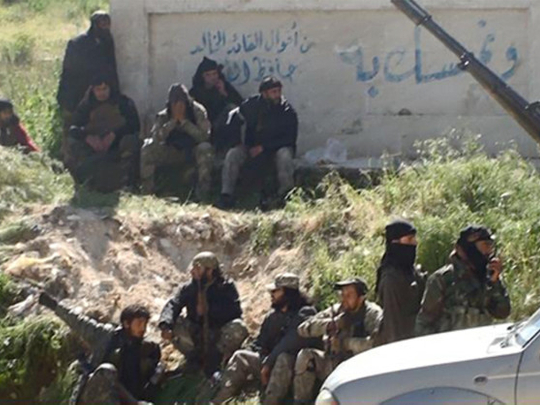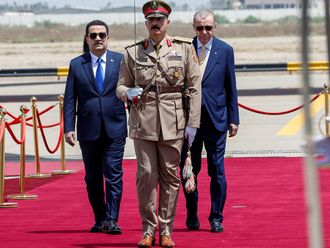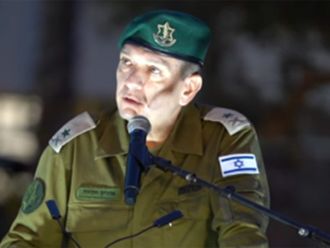
Beirut: Insurgents seized more parts of the northern Syrian province of Idlib on Saturday in a significant advance toward the government-held coast that seemed to signal new coordination among anti-government fighters, some using advanced anti-tank weapons.
The advances showed that government forces have so far been unable to retake the city of Idlib, the provincial capital. It was seized last month by Islamist insurgent groups that included Al Qaida’s Syrian branch, Al Nusra Front, but not Daesh.
President Bashar Al Assad has hung on during a four-year insurgency, but his forces have been unable to retake control of large parts of Syria, and in recent weeks insurgents opposed both to his rule and to Daesh have made advances in the north and south.
On Saturday, insurgents including Al Nusra Front, the hard-line Islamist group Ahrar Al Sham and the relatively nationalist groups calling themselves the Free Syrian Army took part in a battle that left Jisr Al Shughour, the province’s second-largest city, in insurgent hands.
Before withdrawing, government forces killed at least two dozen prisoners being held by military security forces, according to a former prisoner who said in a video from his hospital bed that he had witnessed the killings and was shot in the chest and hand.
Other video images posted by fighters and anti-government activists showed insurgents, including some with Fursan Al Haq, a Free Syrian Army group, using what appeared to be guided anti-tank missiles to blow up armored vehicles in the battles in Idlib Province in recent days.
Last year, the US provided a small number of TOW anti-tank missiles to some rebel groups. But those groups were largely routed or co-opted by Al Nusra Front, further complicating what was already a murky battlefield that has left U.S. officials wary of providing more robust aid to insurgents.
Now, though, some opposition advocates say that Saudi Arabia and Turkey, longtime supporters of the uprising against Al Assad, are prepared to step up aid to insurgents with or without US support. Saudi Arabia has flexed its muscles lately in the region, most notably with its air war in Yemen, to counteract what it sees as dangerous steps toward reconciliation between Iran, its main rival, and the United States.
The Syrian government blamed regional aid to the insurgents for their advances, saying through the state news agency SANA that its forces were “facing the terrorist groups flowing in huge numbers through the Turkish border.”
Oubai Shahbandar, a media consultant who has worked for various pro-insurgent groups, also attributed the advances to “Arab allied support with coordination by Turkish partners,” adding, “We may be seeing the fruits of the latest Turkish-Saudi rapprochement.”
But Fares Bayoush, a Fursan al-Haq commander, said in a Skype interview that the more important factor was the coordination on several fronts between hundreds of fighters, as well as weapons seized in previous battles in the province.
Bayoush said that the anti-tank missiles were not new, but that what had changed was that the insurgents had a clear goal in taking Jisr al-Shughour, putting them a step closer to being able to attack the coastal cities.
An insurgent advance to the coast would move the fighting to one of the few remaining peaceful areas of the country and run the risk of indiscriminate killings of government supporters. Hard-line Islamist insurgents have threatened revenge, particularly on members of the Alawite sect to which Al Assad belongs, a crucial part of his base.
Thousands of people displaced from insurgent-held areas are sheltering in the government-held coastal provinces of Latakia and Tartous, areas where support for Al Assad is strongest.
Bayoush said he urged those civilians to stop sending their sons to the army, adding: “They’re dying for what? This regime has no friend and they are ready to sacrifice you.”
He said that fighters were under orders not to harm pro-government civilians. But his group had no control over factions like Al Nusra Front.











